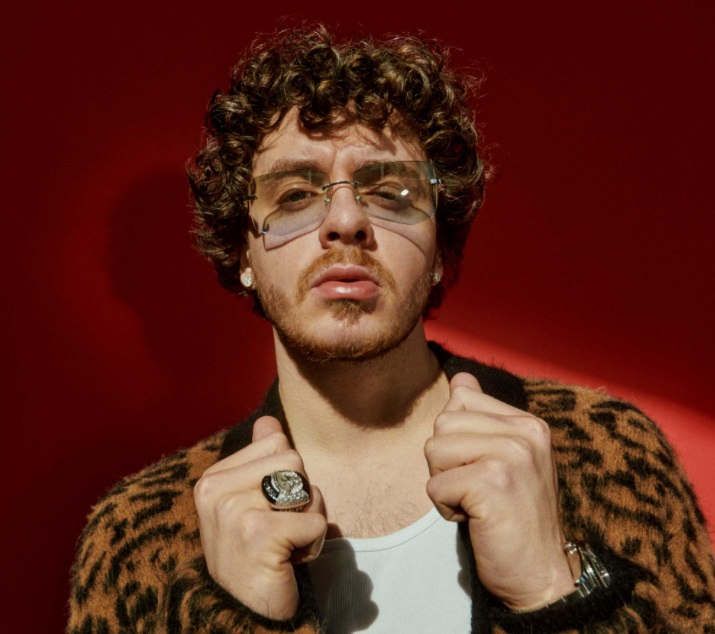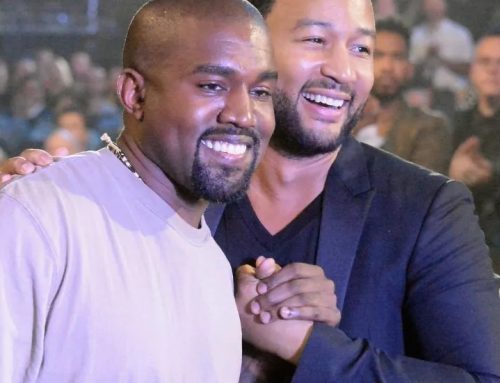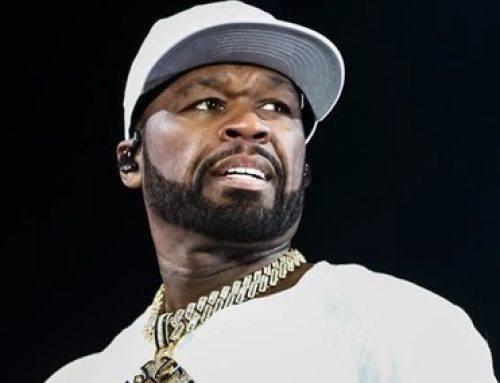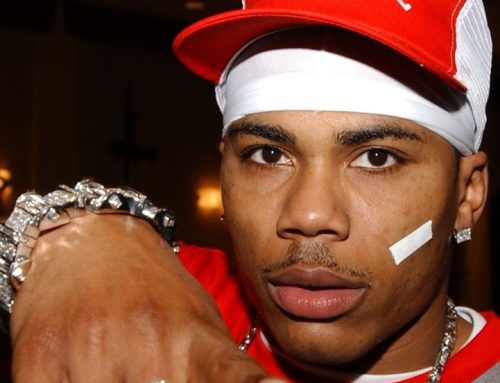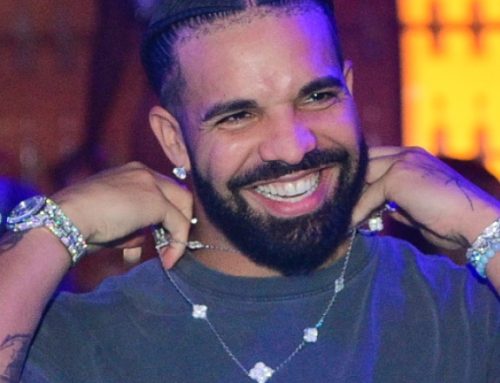The rapper reflects on his friendship with Lil Nas X, his explosive 2021 and his next album.
Three years ago, an energetic 20-year-old who looked like a young boxer hungry for his big fight stepped onto the tiny stage at Iron City Bham, a historic concert venue in Birmingham, Ala. It was the very first stop on Jack Harlow’s very first tour, but it wasn’t off to a great start: Only about 20 people had come out for the show. Still, undeterred by the low turnout, the rapper approached his set with the enthusiasm of a Coachella headliner, flashing a cocky grin and cracking jokes with the few people in the audience, even sticking around after to pose for pictures with anybody who wanted one.
Flash forward to November, and Harlow is back in Birmingham, at the same venue — in front of a sold-out crowd of 1,300. Harlow himself is now a platinum-selling rap star who has evolved from a scraggly, glasses-wearing MC to a debonair showman and one of the buzziest names in hip-hop. (Appropriately, the trek is called the Créme de la Créme Tour.) The other night, Drake came to one of his shows — the ultimate co-sign for a 23-year-old from Louisville, Ky., who came up idolizing him — but just as exciting for Harlow was the moment he recognized a fan in the crowd from that 2018 concert.
“These moments… they just keep happening,” says a still-awestruck Harlow on Zoom days after the show. “It gives so much meaning to the entire journey. I appreciate it more because I know what it felt like when it wasn’t there. I’m desperate to keep my fans’ attention during shows because it all feels so fragile to me. I think I go extra hard, the extra mile, because it’s like I have this fear in the back of my mind of losing them. I remember when I didn’t have it.”
Harlow could be forgiven if he let himself simply enjoy this moment. But since the June 2020 release of “Whats Poppin” — a Grammy Award-nominated showcase for his quick-witted lyrical prowess that jumped from TikTok to No. 2 on the Billboard Hot 100 thanks to a star-studded remix featuring Lil Wayne, DaBaby and Tory Lanez — Harlow has hardly slowed down. His debut album, That’s What They All Say, released in 2020 on the burgeoning Atlantic imprint Generation Now, spawned three other charting hits and was recently certified platinum, proving that he not only had a gift for wordplay but also a heartfelt perspective as he rapped about topics like imposter syndrome (“Keep It Light”) and white privilege (“Baxter Avenue”). Throughout the past year, he has also whisked through key festival stops — Rolling Loud, Lollapalooza, Austin City Limits — before setting out on his own headlining tour.
“I’m not a novelty act,” says Harlow pensively. Though he can appear rambunctious in his songs and videos, in conversation, he is almost meditative, taking time to reflect on his thoughts before he speaks. “There is a certain reality that I am white, and I think there will always be something attached to that. No matter how embraced I am, there will never be a day that I’m Black. With that being said, there’s a certain responsibility that comes with being a white man in a Black genre, and there’s certain things that have me regarded differently. But there is something exciting about skipping over any barriers that might be there and creating unity.”

And that’s exactly what he did as a featured guest on one of the year’s most explosive hits: Lil Nas X’s “Industry Baby.” Co-produced by duo Take A Daytrip and Kanye West, the triumphant anthem about persevering against naysayers topped the Hot 100 in October — Harlow’s first No. 1 on the chart, and a victory lap for both him and Nas, hip-hop rookies who had overcome early skepticism around their monster debut hits to become undeniable, multifaceted stars in their own right.
“What impressed me the most about Jack’s verse was that before we did it, he reached out directly and let Nas know he wanted to work” with him, recalls Denzel Baptiste, one-half of Take A Daytrip. “When we got the verse back, it was this super-long idea. It wouldn’t normally fit a pop-song structure, but there were so many amazing moments in it. We produced around it in a way that made it a huge focal point of the song.”
Released in July, “Industry Baby” arrived with the kind of fanfare and eye-popping visuals that have become the norm for a Lil Nas X release. Coming off his “Montero (Call Me by Your Name)” video, in which he pole-danced down to hell and gave Satan a lap dance before killing him, Nas upped the ante for “Industry Baby.” In the blockbuster clip, poking fun at the pearl-clutching that “Montero” inspired, Nas is sentenced to time at Montero State Prison, where he takes over a fluorescent pink-clad, all-male prison gang; dances with them in the showers totally nude (save for some strategic pixelation); and finally escapes with the help of his buddy Harlow.
Though Nas attracted the majority of critical attention for the video — both positive and less so from the usual conservative corners — Harlow’s scene-stealing verse (with one-liners like “I sent her back to her boyfriend with my handprint on her ass cheek”) and lovable-goofball presence (in the video and in televised performances that followed) sparked plenty of conversation, too. “I had total faith he was going to make a tasteful decision for me,” says Harlow, who delivers his verse while the seemingly lone female inmate gets handsy with him. “I felt good about it. For anyone to think that Nas isn’t aware or clever enough to create a treatment that wouldn’t fit me isn’t looking very deeply into it because that was the least of my worries. He knows what it is. He’s very aware and knows we’re not the same person.”
Harlow was the only male rapper to appear on Nas’ Montero album, which did not go unnoticed by some of the latter’s detractors. (When one Twitter user suggested his choice in the album’s guest artists, who are all either women or white men, was part of some “agenda” to undermine Black men, Nas replied, “Maybe a lot of them just don’t want to work with me.”) In subsequent interviews, Nas also revealed he had first tried to get his idol, Nicki Minaj, on “Industry Baby” but that it didn’t work out — “I’m not sure how comfortable Nicki would have felt with that video or whatnot,” he later mused to GQ. Harlow, however, had no hesitation. “He has always been an ally while remaining authentically himself,” says Baptiste. “It has never been performative.”
Ultimately, “Industry Baby” allowed Harlow to ascend the mainstream his own way — a crossover without compromise. “It was honestly my first pop moment. I had turned down a few big pop moments, ones that could have potentially been big for my career,” he says. “I wanted to remain hip-hop. People think of white rappers using hip-hop as a vehicle. It’s important that people know I love hip-hop and want to stay in hip-hop and want to be part of hip-hop, and I’m using it as a vehicle to fuel my dreams.”
——————————————————————————————————————————————-
Back in March, fans got a glimpse of what Jack Harlow looked like before pop stardom was even a glimmer in his eye. In a 10-second clip he posted on Instagram, a middle-school-aged Harlow raps and dances alongside his friends (sample lyric: “I mean I’m sorry, I wish I can make it to your birthday party”), showcasing the nerdy yet defiant personality that made him a Louisville wunderkind. It went viral, getting 4.6 million views and catching the attention of Kendrick Lamar — who broke his two-year-long social media hiatus to like the tweet — and Drake, whom Harlow calls “the face of my adolescence.”
When Drake attended the Créme de la Créme Tour’s Toronto stop in November, Harlow paused the show to shout him out and pay homage. “I was raised on Drake. He came out when I was in sixth grade. I remember going into middle school, and ‘Best I Ever Had’ was on the radio nonstop,” he says today. “I can’t even put into words the validation [I felt]. I want to pat myself on the back in a way as [my] 13-year-old [self]: ‘What you thought could happen, happened.’ ”

Harlow’s affinity for rap music, and his work ethic, developed early. As a 10-year-old growing up in Louisville, he dug into his mother’s A Tribe Called Quest, Public Enemy and N.W.A albums, then put pen to paper for the first time on his own a year later, recording his first CD, Rippin and Rappin, on a Guitar Hero microphone. (He later sold copies for $2 apiece at his middle school.) In seventh grade, he made a mixtape, Extra Credit, and gave away 100 copies.
By the time he was a high school freshman, Harlow caught the attention of Def Jam Recordings after a friend put his YouTube videos in front of then-president Joie Manda. But during contract negotiations, Manda exited the label, leaving Harlow uncertain about whether others at Def Jam had the same enthusiasm for him. He turned down the deal, brushed off the missed opportunity and rebounded. He released more projects independently — 2015’s The Handsome Harlow and 2016’s 18, which captured his magnetic personality and wit as a wordsmith — and built a loyal hometown following, selling out local shows and generating millions of streams thanks to buzzy tracks like “Ice Cream.”
With his 2017 mixtape, Gazebo, and its trunk-rattling single “Dark Knight,” Harlow got on the radar of his next champions: DJ Drama and Leighton “Lake” Morrison, the founders of hip-hop label Generation Now, who previously shepherded Lil Uzi Vert to mainstream success. Both had learned about Harlow separately. Drama had started following him on Instagram after a friend talked him up, while Lake heard about him through KY Engineerin’, a famed Louisville engineer who contributed to Gazebo and is best known for his work with Lil Wayne, 2 Chainz and Meek Mill. When the two executives finally met up with Harlow in Atlanta in 2018, they knew it was a match right away.
“We liked what was going on, and we saw the potential,” recalls Drama. “We were like, ‘We have to get this kid. He’s special.’ ”
“Jack’s future has endless potential,” adds Morrison. “He’s the total package, a great artist, creative, charismatic and intelligent. I say this as humbly as I possibly can, but he has the ability to be the best in the game if he continues on this path.”

Harlow signed to Generation Now and Atlantic Records in August 2018, and, as usual, didn’t waste time. He released a new single, “Sundown,” the day his signing announcement went out, then dropped the mixtape Loose two weeks later. Co-signs poured in, with Diddy dubbing Harlow his “favorite rapper” and fellow Louisvillian Bryson Tiller teaming up with him for 2019’s “Thru the Night,” solidifying Harlow’s grip on his hometown rap scene’s heart.
The same charm on display in his throwback viral video was proving to be his biggest selling point as an emerging star. “I was the fresh 22-year-old kid and knew all the girls in town, and we were throwing parties and shooting videos, and everything was really off the cuff,” says Harlow of this time. “I was drinking and having fun and making myself accessible. I was warm and welcoming. I was very inclusive of the city, and it was a great era. Everyone in my circle looks back on that time with a lot of joy.” Or, as he put it in his “Industry Baby” verse: “I’m just a late bloomer/I didn’t peak in high school, I’m still out here getting cuter.”
——————————————————————————————————————————————
Outside the MTV Video Music Awards in September, a throng of fans begins howling incessantly. Harlow is making his rounds on the red carpet outside Brooklyn’s Barclays Center, and screams of “Harlow, you’re so hot!” ripple through the crowd, making the young bachelor stagger momentarily. Lil Nas X — clad in a lilac Versace ensemble that’s half suit, half gown — catches Harlow and gives him a warm hug.
A late addition to the VMAs lineup, Harlow is there to perform “Industry Baby” with Nas for the first time, though earlier in the summer, he had done so solo at Rolling Loud Miami, two days after the song’s release. “This MFer beat me to the first performance of the song,” joked Nas on Twitter after spotting a video from the festival.
“What I admire about Nas is his humor and, [even] more, his rebellious nature, how he really doesn’t give a s–t. I think that’s powerful, and it ages well,” says Harlow. “He’s going to leave a long legacy behind him. I think some people have mistaken him for gimmicky or a novelty, but he’s bigger than that. I think he’s speaking for a lot of kids who don’t often get a voice in pop culture.”

In the wake of “Industry Baby,” the hip-hop world is noticing Harlow’s potential to be a secret weapon on potential hits, too. He has joined another one of his heroes, Eminem, on a remix of his “Killer,” but he’s still making time for rising artists, like when he jumped on a new version of Detroit rapper Babyface Ray’s “Paperwork” in May.
“Great rappers always know how to deliver hooky quotables within songs. Jack’s amazing at establishing moments within songs that allow for different kinds of crowd response,” says David Biral, the other half of Take A Daytrip. “Those moments also inform what we do as producers, giving us dynamic performance pieces to build around.”
As Harlow works on his next album, which he expects to release in late spring or early summer of 2022, he’s reveling in his own moment — including Grammy nominations for “Industry Baby” in the best melodic rap performance category and for album of the year, as a featured artist on Montero — while preparing to give back to Louisville with five performances at five of the city’s iconic venues in December. He has thought a lot about his place in hip-hop lately, about what he brings to the table, and he plans to deliver accordingly with his new music.
“I think the game needs some urgency, with everything being kind of a vibe right now,” says Harlow. “It will be a boost of energy for people. You’ll be able to hear in my voice that I’m realizing what I am and what I could be and what I need to work hard to be. My star is rising, and I’m kind of documenting that process and showing you where I want to take it next. I’m stepping into being a star comfortably. I want to entertain.”

